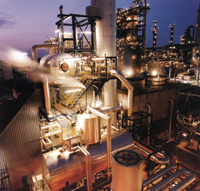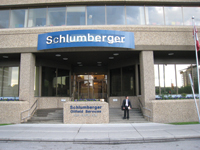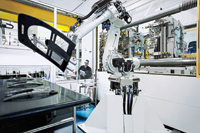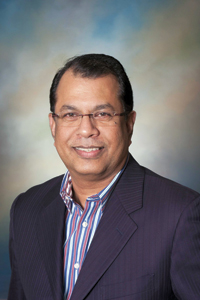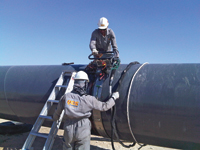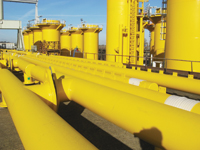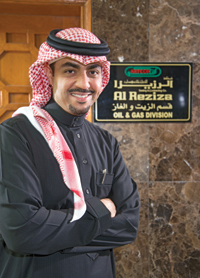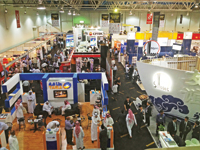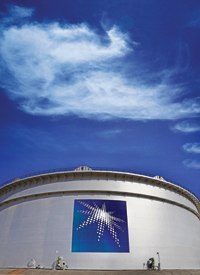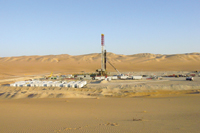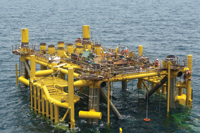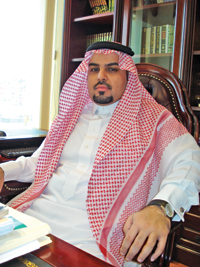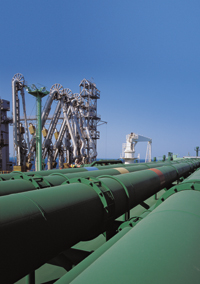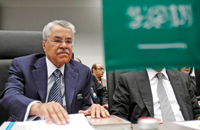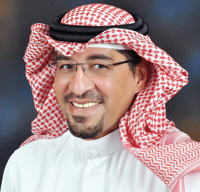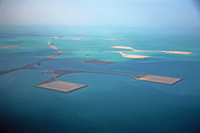
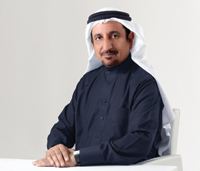 Al Mady ... stewarding Sabic through uncertain times
Al Mady ... stewarding Sabic through uncertain times
THE head of the world’s largest petrochemical company, Mohamed Al Mady, the vice-chairman and CEO of Saudi Basic Industries Corporation (Sabic) says the dynamics of petrochemical industry is set to change, once again.
He terms the shale-gas find as ‘a revolution’ and says producers need to focus on ‘new and advanced technology’ to maximise returns.
“The global petrochemicals industry needs to deal more and more, not only with the economic uncertainty, but also with a rapidly changing world. Flexibility and responsiveness to both change and uncertainty have become key requirements in our industry,” he says on the sidelines of the GPCA forum in Dubai.
Al Mady says the petrochemical industry is often the bellwether of the global economy. 2008 and 2009 were years best forgotten, according to most industry experts for the world economies, and more specifically the petrochemical industry. But the GCC petrochemical industry has weathered the storm that hit the global economies and is building itself back, slowly and surely.
Al Mady says in a relatively short span of less than four decades, the regional petrochemicals industry has grown to be a leading global player.
“The industry has remained strong despite the prevailing economic climate – production capacity grew 13. 5 per cent last year, to nearly 116 million tonnes, up from 102 million tonnes in 2010; and sales generated by the GCC petrochemicals sector reached $100 billion in 2011.
“Sabic has itself grown from a company that employed six people in 1976 to one that employs more than 40,000 employees, across 40 countries with a market capitalisation in excess of $88 billion. It was Al Mady who completed the acquisition of GE Plastics in 2007 and integrated the largest US engineering plastics firm with Sabic’s European and Asian operations. The integration symbolised organizational achievement virtually unprecedented for a Saudi Arabian business.”
“If there is one thing I would like to be remembered for, it’s creating the best human resources development plan in the kingdom of Saudi Arabia,” Al Mady says.
 |
Petrochemicals to the fore |
At the forum, the CEO remarked that the progress made by the GCC petrochemical industry given the unstable economic conditions reflected remarkable resilience. But to sustain this level of growth, we need to bring in change, he adds.
Innovation and technology are key areas to focus on, he says. “The role of technology in our success cannot be underestimated, especially given the competitive feedstock situation in the global chemical industry. Being an energy-intensive industry, we cannot be oblivious to changes in the energy sector, which is driven by global megatrends,” he adds.
The Sabic head says: “If we were to examine the trends, several key factors will emerge.” One of the major issues that he points to was the increased demand for hydrocarbon resources.
“The shale gas revolution has led to advantaged energy and feedstock in North America. It is expected that this will extend to other regions including China, Eastern Europe, Africa and Australia.
“This, as a result, he says, has led to a race for sustainable use of hydrocarbon resources. Al Mady cautions that new centres of economic power have surfaced in these shifting circumstances.
Consultancy Booz & Company had warned recently that while North America was “awash with natural gas”, in the Gulf region “looming gas supply shortages could challenge growth” for petrochemical companies. The price of natural gas in the US is about $3.75 per million British thermal units, down from more than $13 in 2008. US ethane has fallen from about $0. 90 a gallon in 2011 to about $0. 30 a gallon in 2012.
It is widely expected that it and other NGLs will remain cheap, as production companies have been increasing the numbers of rigs they have been drilling for liquids. Ethane accounts for almost 40 per cent of NGL production and it is used almost exclusively to produce ethylene, which is then turned into plastics. Other NGLs are propane and butane. The price of propane, butane and other liquids is also sharply down this year.
Al Mady says that for Sabic it was “important that we participate” in the growth of the US industry. He says Sabic is already in talks with companies in the US, with the aim of either forming a joint venture or towards making an investment on its own. When asked about the kind of investment Sabic was looking to make, Al Mady says it was too early to comment on it any further.
Al Mady: “We’d like to start with one plant, just to get ourselves in the region.”
However, the CEO says the challenges were not all about feedstock. Gas was one part of the challenge, the petrochemical industry was facing. Use of technology was today more relevant, than ever before, he says. “I can give you an example of how technology is improving productivity in the downstream industry,” he adds.
“Methanol-to-olefins and methanol-to-propylene technology is enabling conversion of advantaged methane to ethylene and propylene. Furthermore, propane dehydrogenation is providing a competitive solution to propylene shortages in North America,” he explains. The downstream industry has historically been behind the upstream industry in the uptake of new technology.
But at the GPCA forum it seemed evident that was already changing. Technology and innovation have a higher impact on the region’s future competitive edge, than feedstock prices and supply seemed to be the overall view.
Hence, the producers need to focus on offering more technologically-advanced and better designed product to the consumers, was the consensus at the forum. So, looking beyond feedstock issues and yet looking at maximising available feedstock is the single-point agenda most producers are trying to resolve today.
But Al Mady’s response to it was that “the petrochemical industry should be part of the solution, and help drive us all towards finding the answers.”
He also says that governments should be encouraged to develop strategies to integrate technologies, including green energy, to help release valuable hydrocarbons for the production of chemicals. Ironically enough, the petrochemical industry and the overall oil and gas fraternity today is pushing for renewable energy, so that the gas can be freed from utilities to the more lucrative downstream industries.
Saudi Arabia, a country awash in oil is the one pushing hardest for renewable energy.
In the Global Economic Symposium in Rio de Janeiro, Prince Turki Al Faisal Al Saud of Saudi Arabia said: “I would like to see Saudi Arabia using 100 per cent renewable energy within my lifetime.
“So Al Mady’s advice to fellow petrochemical producers for the year 2013 is: “Well, it’s time to adapt to change again,” he quips. So, with the feedstock challenge and US shale gas find – can the petrochemical industry look at a sustainable future?
“Sustainability makes sense, when it makes money,” he says with a smile. But on a more serious note, Al Mady concludes that sustainability boils down to conservation of existing resources and “making more with less”.




































































